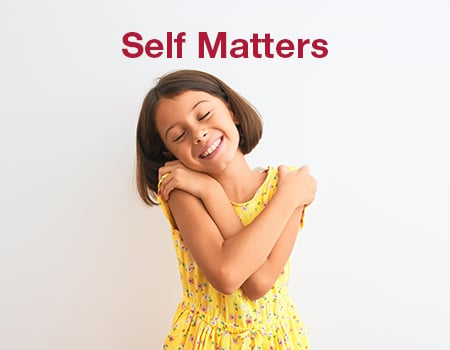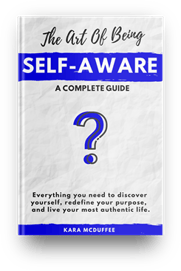Self-awareness is our ability to identify our thoughts, feelings, and behaviors. It’s all about understanding who we are and how we fit in the world. As such, it’s one of the most important elements in living a happy, healthy, purposeful life. Yet, most of us lack self-awareness. That’s because our human biology makes it incredibly tricky to be self-aware.
Fortunately, we can develop our self-awareness with practice. When armed with the right tools - knowledge, questions, and (of course) our journals - we can build our insight and reclaim the life we want.
Today’s self-awareness lesson: How You Can Use Uncertainty as a Life-Changing Tool
(and why becoming comfortable with uncertainty can unlock your life)
Right now, our lives are filled with uncertainty. It’s hard to believe that, just one year ago, we first went into lockdown in this pandemic. I remember thinking last March, How long will this last? How bad will it get? There were so many unanswered questions for our personal lives and for our society.
While there’s greater clarity today than before, there’s still a lot that’s up in the air. This pandemic has affected everyone differently. However, we’ve all had to deal with one universal phenomenon: living with uncertainty.
And for many of us, that’s been one of the most challenging parts.
What does uncertainty look like in our lives?
Uncertainty is a simple concept in and of itself. It’s when we don’t know what the result will be or how something will turn out. We may be able to predict an outcome, but we can’t know the outcome.
While simple in theory, uncertainty can take on many different forms in our personal lives.
Sometimes, as with this pandemic, we’re faced with the uncertainty of the world. What will happen with our nation? How will our society react to certain events? These questions feel distant from us but can still have drastic effects on our personal lives. The grandness of society can leave us feeling small and out of control.
In other cases, uncertainty happens closer to us. Perhaps we don’t know what direction our work will go or what our family members will do. These events again leave us feeling unsettled because we can’t control the decisions and actions of other people.
Finally, uncertainty springs up regularly in our day-to-day lives. Every time we take an emotional risk or put ourselves out there, we’re uncertain of the outcome. Living an authentic life means taking risks, over and over again, that people may or may not accept us.
Sometimes we’re uncertain about our own reactions.
In addition to the unreliability of our external world, we also can’t be 100% certain of our internal world, either. As much as we may think we’re in control, we are wildly reactive to our environments and emotions. If you’ve ever said something in anger that you’ve regretted, you know that you weren’t as in control as you may have thought.
A primary culprit for this lack of control is our lack of self-awareness. We can’t start managing our emotions until we identify what they are. That’s why turning to your journal and doing Inner Work is your first step.
Self-Awareness Crash Course: Our Body and Brain’s Reaction to Uncertainty
Two major players are involved when it comes to our aversion to uncertainty.
First up, our emotions. Living in uncertainty provokes our primal emotion of fear because it kicks our survival instincts into gear. This makes sense, as our evolutionary ancestors needed to avoid dangerous situations and control their food supplies. If they didn’t know where their next meal was coming from, they wouldn’t have survived very long.
Furthermore, our evolutionary ancestors depended on their social belonging to survive. If their peers rejected them, it didn’t just mean loneliness - it meant death. Because of this need for belonging, uncertainty in social settings triggers our fear.
The second player is our brain. Our brain responded to this need for certainty with its mechanisms and biases. Since it’d be impossible to know everything, our brain has developed shortcuts to make us feel more in control of the information we have. Biases make us only hear information that supports our preconceptions; selective attention allows us to avoid new ideas that may move us toward uncertainty.
In the modern world, these two players - our primal fear and biased brain - motivate us to avoid uncertainty at all costs.
They also create oodles of anxiety when we can’t.
Why Uncertainty Is Good For Us
While our prehistoric counterparts had a reason to eliminate uncertainty, there are many benefits to inviting uncertainty today. In fact, we can use uncertainty as a life-changing tool.
-
Uncertainty helps us expand our thinking and learn new things.
Imagine if you did the same thing every single day, or if you never learned anything new after age 25. While this life would feel safe and certain, it would lack growth and purpose. Every time we learn something new, a new pathway lights up in our brain. The more we do, the more connections we can make. Therefore, some uncertainty is good because it means we can expand our thinking and learn new things.
-
Uncertainty teaches us that we can grow.
Uncertainty doesn’t just encourage us to learn more; it also helps us become more. When we are willing to take risks, we’re opening ourselves up to personal growth. Many of us think we can grow by simply thinking or talking about something. In reality, we’ve got to act - and live with uncertainty - to grow.
-
Uncertainty helps us break free of our need for social approval.
Because of our need for belonging, uncertainty often comes in the form of social approval. We’re afraid to take emotional risks because we don’t know if other people will accept or reject us. However, when we put ourselves out there, push through uncertainty, and make ourselves vulnerable, we’ll slowly begin to break free of our need for social approval. Then, we can begin living a more authentic life.
-
Uncertainty helps us become more confident.
The reason our fear of uncertainty is so powerful is that our brain is screaming, You can’t do this! You’re going to fail! We need ammo to fight this voice back, and experience is the best weapon. The more you learn to live with uncertainty, the more you realize that you can live with uncertainty. As a result, you’ll become more confident in your ability to get through difficult situations.
How to Use Uncertainty as a Life-Changing Tool
Uncertainty is inevitable in our lives. But it can be life-changing if we learn how to approach it in the right way.
Remember, your primal emotions and brain biases will be screaming at you to avoid uncertainty. That’s why you must train yourself to push past these initial warnings.
Step One: Determine if your fears serve you.
Uncertainty will trigger the fear center in your brain. Then, your anxieties will step in with big warnings like, “Don’t do it! Back away! Avoid at all costs!”
At times, these warnings will be good. For example, if your fear center is triggered because you’re standing at the edge of a cliff, you should probably listen. More often than not, however, these fears aren’t as severe as they want you to believe. Determine if your fears serve you. If they don’t, it’s time to move past them.
Journal prompts to question your fear:
- Does this fear serve me? Is this fear valid?
- What would my best friend tell me about the validity of this fear?
- What is the worst-case scenario, and can I live with that?
Step Two: Reframe your mindset.
When our survival instincts are triggered, we tend to focus only on the potential dangers. Our brain biases make us look at what we could lose, the most negative outcome, and everything bad on the side of “What if?”
You can’t stop this line of thinking from happening. However, you can force your brain to switch away from it. By reframing your mindset, you can help bring in a more logical perspective on the situation. You can even begin to appreciate uncertainty for the growth it will give you.
This reframing takes practice, but it doesn’t require anything elaborate. By stepping back, changing your language, and asking different questions, you can change your focus from what you’ll lose to what you can gain.
Journal prompts to question your fear:
- What can you gain from this period of uncertainty?
- How will this experience help you grow?
- When have you survived and grown from uncertainty in the past?
Step Three: Turn to your journal for reflection.
There are excellent odds that uncertainty will, at some point, leave you feeling vulnerable, upset, or down on yourself. It’s almost impossible not to. The key is for you to treat yourself compassionately as you ride out the negative emotional wave. Then, turn to your journal for comfort and reflection.
Often, feelings of uncertainty cause us to get sucked into destructive rumination cycles. When this happens, we get stuck thinking about the same adverse outcomes over and over again. Journaling can help us cut off this rumination cycle and turn it into positive reflection.
When we journal about what we experienced and learned, we can develop our self-awareness. Ultimately, this reflection will help increase our growth and build our confidence for the future.
Journal prompts to question your fear:
- What does your mind keep thinking about? Do these thoughts serve you?
- What did this experience teach you about yourself?
- How did you handle this period of uncertainty? How would you handle it differently in the future?
Conclusion: How You Can Use Uncertainty as a Life-Changing Tool
Everything about our brains and bodies tells us to avoid uncertainty at all costs. However, not only is it impossible to avoid uncertainty, but we shouldn’t want to. It’s through periods of uncertainty that we can expand our thinking, grow, let go of others’ opinions, and develop more confidence in ourselves.
Next time you’re faced with uncertainty, follow these three steps.
- Step one: Determine if your fears serve you
- Step two: Reframe your mindset
- Step three: Turn to your journal for reflection
These steps will help give you more practice at living with uncertainty. As a result, you’ll develop your self-awareness and confidence in handling uncertainty in the future.

Kara McDuffee is the writer and founder of My Question Life, a community dedicated to helping you discover yourself and find the answers you’re searching for. She gives you the questions you need to become more self-aware and vulnerable in your everyday life. To read her posts or download her free eBook The Art of Being Self-Aware, check out her blog.




Leave Comment